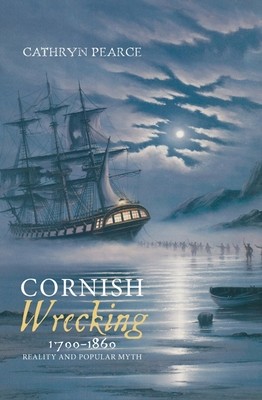
- We will send in 10–14 business days.
- Author: Cathryn J Pearce
- Publisher: Boydell Press
- ISBN-10: 184383555X
- ISBN-13: 9781843835554
- Format: 15.2 x 23.6 x 2.3 cm, hardcover
- Language: English
- SAVE -10% with code: EXTRA
Reviews
Description
Shows how the image of Cornish wreckers as villains deliberately luring ships on to the rocks is a myth.
Although the popular myth of Cornish wrecking is well-known within British culture, this book is the first comprehensive, systematic inquiry to separate out the layers of myth from the actual practices. Weaving in legal, social and cultural history, it traces the development of wreck law - the right to salvage goods washed on shore - and explores the responses of a coastal populace who found their customary practices increasingly outside the law, especially as local individual rights were being curtailed and the role of centralised authority asserted.This groundbreaking study also considers the myths surrounding wrecking, showing how these developed over time, and how moral attitudes towards wrecking changed. Overall, the picture of evil wreckers deliberately luring ships onto the rocks is dispelled, to be replaced by a detailed picture of a coastal populace - poor and gentry alike - who were involved in a multi-faceted, sophisticated coastal practice and who had their own complex popular beliefs about the harvest and salvage of goods washing ashore from shipwreck. CATHRYN J. PEARCE holds a PhD in Maritime History from Greenwich Maritime Institute. A former associate professor of history with the University of Alaska Anchorage's Kenai Peninsula College, she is now with University Campus Suffolk where she continues to research on the relationship of coastal people with the sea.
EXTRA 10 % discount with code: EXTRA
The promotion ends in 19d.05:47:42
The discount code is valid when purchasing from 10 €. Discounts do not stack.
- Author: Cathryn J Pearce
- Publisher: Boydell Press
- ISBN-10: 184383555X
- ISBN-13: 9781843835554
- Format: 15.2 x 23.6 x 2.3 cm, hardcover
- Language: English English
Shows how the image of Cornish wreckers as villains deliberately luring ships on to the rocks is a myth.
Although the popular myth of Cornish wrecking is well-known within British culture, this book is the first comprehensive, systematic inquiry to separate out the layers of myth from the actual practices. Weaving in legal, social and cultural history, it traces the development of wreck law - the right to salvage goods washed on shore - and explores the responses of a coastal populace who found their customary practices increasingly outside the law, especially as local individual rights were being curtailed and the role of centralised authority asserted.This groundbreaking study also considers the myths surrounding wrecking, showing how these developed over time, and how moral attitudes towards wrecking changed. Overall, the picture of evil wreckers deliberately luring ships onto the rocks is dispelled, to be replaced by a detailed picture of a coastal populace - poor and gentry alike - who were involved in a multi-faceted, sophisticated coastal practice and who had their own complex popular beliefs about the harvest and salvage of goods washing ashore from shipwreck. CATHRYN J. PEARCE holds a PhD in Maritime History from Greenwich Maritime Institute. A former associate professor of history with the University of Alaska Anchorage's Kenai Peninsula College, she is now with University Campus Suffolk where she continues to research on the relationship of coastal people with the sea.


Reviews